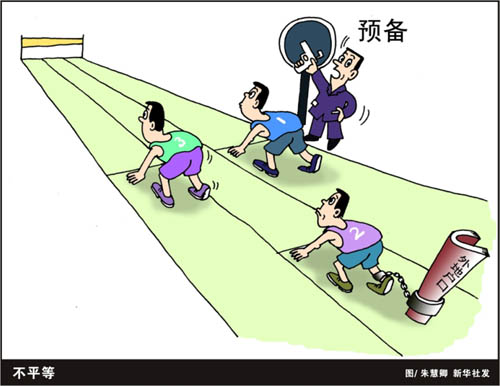Duncan Green: equality key to reduce poverty
chinagate.cn by FAN Anqi, June 12, 2016 Adjust font size:

Dr. Duncan Green, a Professor in Practice in International Development at the London School of Economics and Political Science (LSE), discussed the issue of equality in China in an exclusive interview with chinagate.cn during his visit to the country.
Dr. Green, who is also a Senior Strategic Adviser at Oxfam GB, gave his comments on the relationship between poverty and equality. "Poverty is about me. I can be poor, and I have no money. " Dr. Green explained. "But as a person, I cannot be unequal - equality is about people's relation with society. And improving equality is crucial for poverty reduction."
He mentioned several possible approaches regarding the rural-urban education gap, gender roles, and rights for the disabled, so as to reduce inequality and improve social stability.
Incentive system crucial for urban-rural education equality
Noticing the teacher shortage in rural China, which has led to the basic education disparity, Dr. Green came up with several suggestions. For one thing, the government could create an incentive system to encourage more young teachers to teach in villages. Online teaching has also become feasible with the popularization of computers in rural China.
In some countries, as Dr. Green pointed out, when people graduate, they have to do one or two years teaching in villages before they are allowed to apply for jobs in the cities. One experiment in Zambia found that public service workers who are recruited by being told that their work will help their future career work longer and harder than those who are told to "work for their community's benefit." "It makes more sense to appeal to people’s personal interests rather than the just public ethos," Dr. Green said.
Gender inequality: increasing burden for women
Gender inequality is not only about domestic violence, but also about the unbalanced distribution of family responsibilities between men and women. Women today have more burdens, since it is still women who are dominant in taking care of the young and the old and doing housework. Meanwhile, more and more women have to work on weekdays.
Dr. Green introduced the parental leave policies of a number of European countries. After the baby is born, both the parents can share parental leave. For example, if they have 12 months of paid leave, the mother can take three months off and the father will take the other nine months, so that parents can look after babies in turn, and burdens are eased.
Europeans have even invented a term for fathers who take leave and look after babies, while drinking coffee and chatting with other people, they call it "Latte papas."
Another way to ease the burdens on women is to guarantee and upgrade child care. If more institutions are organized to take better care of children, parents can leave children earlier to attend to other things.
The "Care economy", as Dr. Green mentioned, puts value on care work such as looking after the old and the young, and doing housework. Normally these kinds of work are not included in economic indicators such as the GDP, and people tend to overlook the importance of women's roles in these caregiving works. "If you start measuring that, it will constitute a considerable part of the GDP," Dr. Green said.
Rights for the disabled: it's like making a rice cake
Disabled people are a largely vulnerable group worldwide, and their situation has attracted growing attention in the past decade. They make up a big part of society, so guaranteeing equity and proper treatment is essential for social development.
"What society needs most is firstly a shift in attitude; that is the most important step," Dr. Green said. Some people regard disabilities as a curse, and they feel ashamed to admit their abnormalities.
Dr. Green offered the idea that disabled people should fight for their rights in groups, like making a rice cake – you need heat from the top as well as from the bottom. The government and organizations such as the United Nations are the forces that provide heat from the top, for example, through international conventions and national laws on disabled people's rights; meanwhile, a widening group of disabled people’s organizations are creating ‘heat from below’, asking governments to take action.